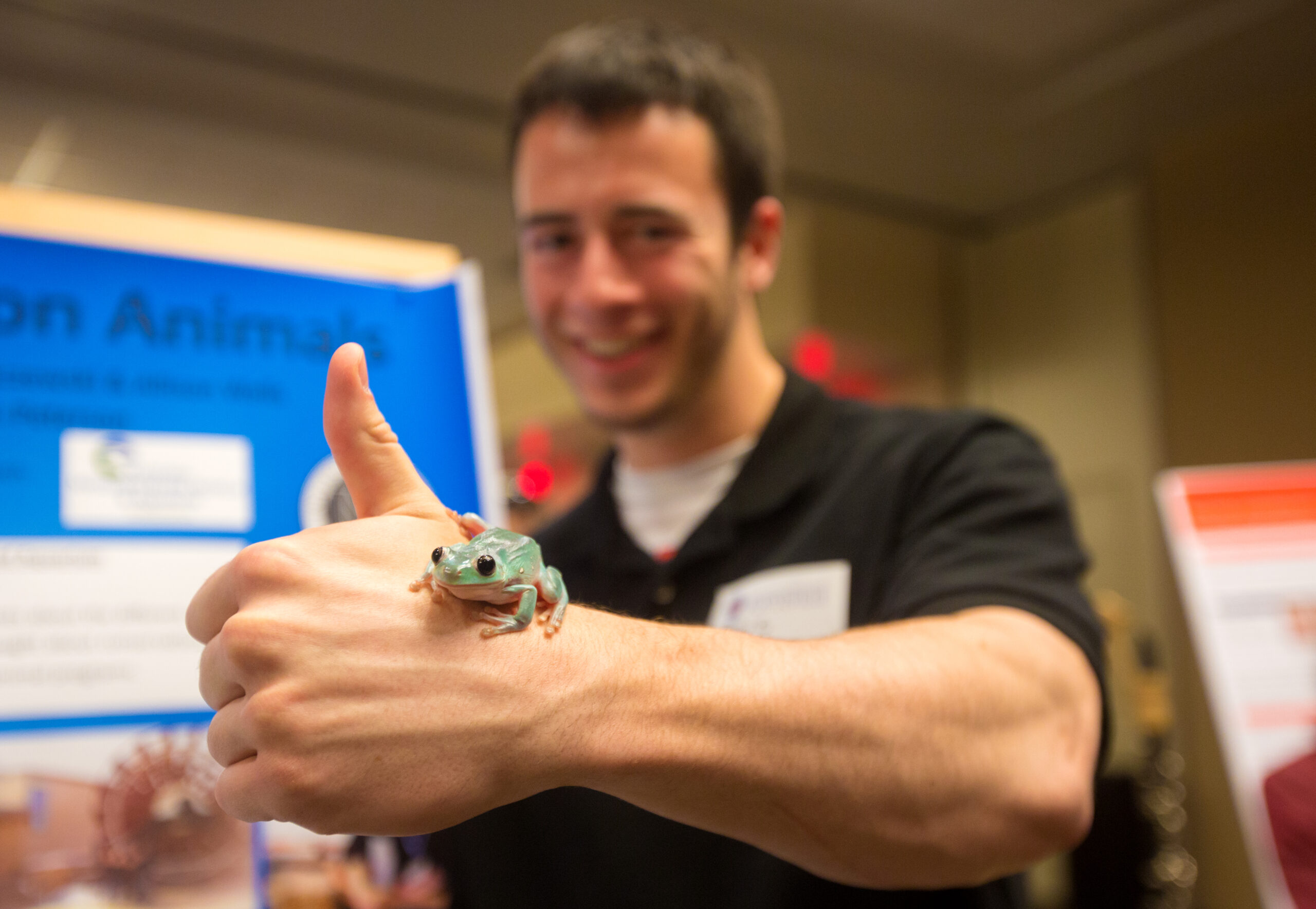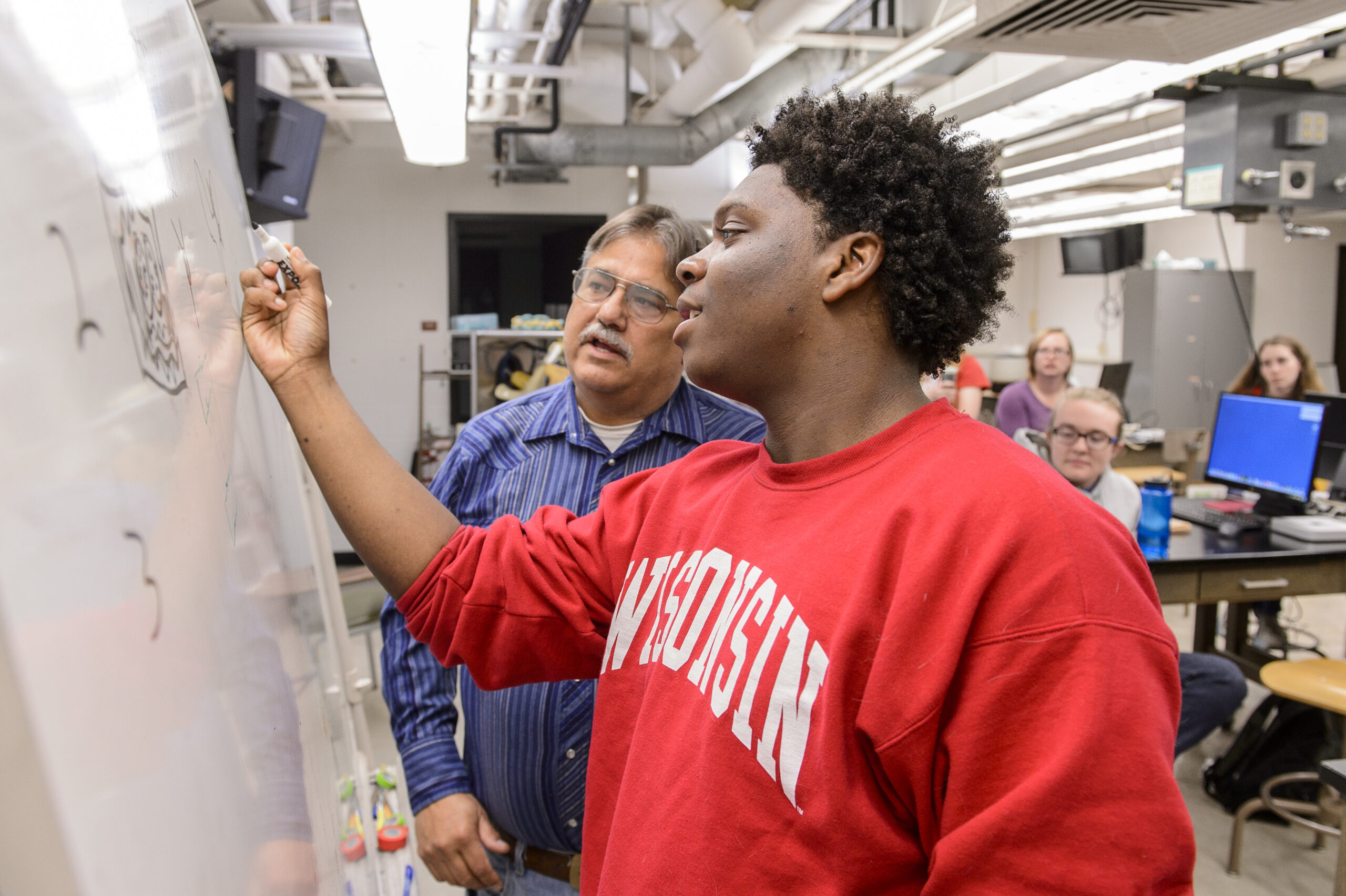
Save the Date!
2026 UW Symposium for Undergraduate Research, Scholarly, and Creative Activity
This event is an exciting opportunity to present your undergraduate research, scholarly, or creative works to peers from across the Universities of Wisconsin. It also provides a great opportunity to learn more about what opportunities exist and how to become involved in undergraduate research.
When: Friday, May 1, 2026.
Where: University of Wisconsin–La Crosse
Registration will open January 26, 2026, and close March 15, 2026.
Learn more about the 2026 UW Symposium for Undergraduate Research, Scholarly, and Creative Activity.
Past Events
Guidance for Presentation Format and Preparation
For those of you who are presenting a poster presentation:
Your poster presentation session is 55 minutes long, and you are required to be at your poster during the time for which you are scheduled. If you have co-presenters, please ensure that they are at the poster during the scheduled time. Posters will be hung on a poster board using pushpins that will be provided at the event. Please be sure to let symposium organizers know of any special accommodations that you may require for your poster presentation.
Some important information to remember as you are preparing your poster:
- Your poster should be no larger than 48 inches in height and 48 inches in width.
- A typical organization for a poster will include:
- Title of your presentation
- Your name, any co-authors’ names, and your faculty mentor’s name
- Name of your university
- Abstract
- Introduction (Background information regarding your research, the research question that you asked/hypothesis or objective of your study)
- Methods (how you did your research or explored a particular topic)
- Findings/Results: tell us what you found and what results you obtained
- Discussion: What do the results mean? How are they important? What additional questions have presented themselves?
- Conclusion/Summary
- Limit the amount of text on your poster, and focus on key information
- When presenting your poster, use your own words to elaborate upon the material and guide the audience on where you want them to focus on the poster.
- Engage in conversation with others while you’re at your poster. Invite people to your poster to learn more about the work that you’ve done!
- Use visuals/graphics...not only are they eye-catching, but they are a great point upon which you can elaborate and explain your points. Be sure, however, to describe what you are showing…don’t just skip over it!
- Focus on what you’ve done (or plan to do), the importance of the study, how you did the study, what results you’ve found, etc.
- Be sure to practice, practice, practice!!! Practicing will allow you to establish how long it will take you to present your material and will also allow for you to develop confidence in your presentation abilities!
For those of you who are presenting an oral presentation:
Oral presentations are limited to 10 minutes with 5 minutes for questions and answers. While PowerPoint is the preferred presentation format and will be available on all computers in the oral session rooms, you may certainly present without the use of PowerPoint if you would prefer to use other visuals (video, demonstrations, speeches, project display, etc). However, please be aware that presenters will be required to use the PC computer provided in the room. Please plan to bring your presentation on an external hard drive. You will be asked to arrive at the presentation room at least 10-15 minutes before the session to load your presentation on the PC computer provided in the room. More details on your presentation time and set-up time will be provided as we near the event. Please be sure to let the symposium organizers of any special accommodations that you may need for your presentation.
Some important information to remember when you are preparing for your presentation:
- Plan the format of your presentation. A common organization for a talk will include the following components; however, prepare the presentation in a format that is logical for sharing your work.
- Title slide with the title of your presentation and your name, any co-authors' names, your mentor’s name, and the name of your university.
- Introduction (Preview of the topic and talk, the research question that you asked/hypothesis or objective of your study)
- Methods or Process (how you did your research or explored a particular topic)
- Findings/Results: tell us what you found and what results you obtained
- Discussion: What do the results mean? How are they important? What additional questions have presented themselves?
- Conclusion: provide a summary of your presentation and provide some form of closing statement.
- Acknowledgement: provide an acknowledgement for any funding agencies and financial support, as well as any individuals (non-coauthors) who contributed to the research but did not provide substantial contribution to the project.
- Limit the amount of text that you put on slides, and focus on key information
- Use your own words to elaborate upon the material on the slide.
- Limit the number of slides- too many slides can be overwhelming to the audience. A 10-minute presentation typically has between 10-15 slides.
- Use visuals/graphics…not only are they eye-catching, but they are a great point upon which you can elaborate and explain your points. Be sure, however, to describe what you are showing…don’t just skip over it!
- Don’t just focus on how you decided to do this research, but focus on what you’ve done (or plan to do), the importance of the study, how you did the study, what results you’ve found, etc.
- Be sure to practice, practice, practice!!! Practicing will allow you to establish how long it will take you to present your material and will also help you to develop confidence in your presentation abilities!
For those of you who are presenting an art or project display:
During Art or Project Displays, students will display their art, interactive projects, or demonstrations for the entire time that their session is scheduled. Similar to a poster presentation, students should share information about their project with attendees circulating the room. Art and Projects may be on display for longer than the scheduled session. Detailed Information regarding setup and scheduling for your display will be provided as we near the event. Please be sure to let symposium organizers know of any special accommodations that you may need for your presentation prior to the event.
For those of you who are presenting a brief film or performance video:
Films and performances should generally be shorter than 15 minutes. If you plan to present a longer piece, consider sharing a clip/segment or shortened version of your work.
Be sure to plan and practice how you will introduce and conclude your film/performance. Many students briefly share their project title, names of project members, and background. Please let symposium organizers know of any specific accommodations or specific needs for your presentation prior to the event. Detailed information regarding the scheduled session will be provided as we near the event.
Frequently Asked Questions
The symposium provides students with an opportunity to showcase their work, develop presentation skills, inspire new ideas, engage with students from other universities, network with professionals, and gain feedback to refine their research. Additionally, presenting their work builds confidence, fosters a sense of community, and enhances their resume for future academic or career opportunities.
Absolutely! Everyone is welcome to attend. Come to learn more about the research, scholarly and creative projects in which students across the UW universities are engaged, gain information on how they became involved in their projects, or come to support your friend or family member.
Note: If you are planning to attend the opening/closing remarks and/or the lunch/keynote session, you must register. Lunch and refreshments will only be provided for those who registered for them by the deadline.
Presenters:
- All presenters must register and check-in at the Union Bluffs Foyer prior to their assigned session. Name tags will be provided at check-in. Registering for the opening/closing remarks and lunch/keynote is optional.
Attendees:
- Any attendees that will be present for the opening/closing remarks and/or the lunch/keynote must register and check-in in the Union Bluffs Foyer. Name tags will be provided at check-in.
- Attendees who will only be attending poster/exhibit or oral presentation/performance sessions do not have to register for the event. These attendees should not check-in and will not receive a name tag.
Note: Lunch and refreshments will only be provided for those who registered for them by the deadline.
Projects from any discipline is welcome.
Yes- all students submitting an abstract will be asked to provide information for the individual who mentored or guided their work.
Yes, students can present research performed at other universities/institutions, provided that their mentor agrees that it's appropriate to present the work.
Of course! Projects may be in progress. We encourage you to discuss your project with your project mentor to confirm that it will be ready for the symposium.
Yes. Alumni may present research that they conducted as an undergraduate at a UW university.
All presentations will take place in Cleary Center (posters/exhibits) and the 3rd Floor Student Union (oral presentations/performances) on Friday, May 1st; however, specific details for presentation times won't be available until after the abstract submission deadline has passed. The symposium organizers will send an update with specific time, room, etc. when the schedule has been finalized.
The symposium venue will provide pushpins for hanging posters.
Yes. You will need to complete the abstract submission form for each abstract.
Yes, we don't have any prohibitions for submitting abstracts used for other conferences. Please confirm with your mentor that you're permitted to present the work at multiple conferences.
Yes, we accept abstracts for research in all stages.
Absolutely! Family and friends are welcome to attend the symposium. We ask that anyone attending the symposium register for the event.
Yes, a time for your presentation will be assigned after abstract submission has closed and a schedule has been finalized. At that time, presenters will be notified by email, and the information will be posted to the symposium website.
Presentations can take various forms, including oral presentations, poster sessions, art displays, or performances, depending on the discipline. Students should be prepared to discuss their work and answer questions from attendees.

